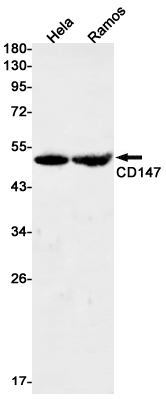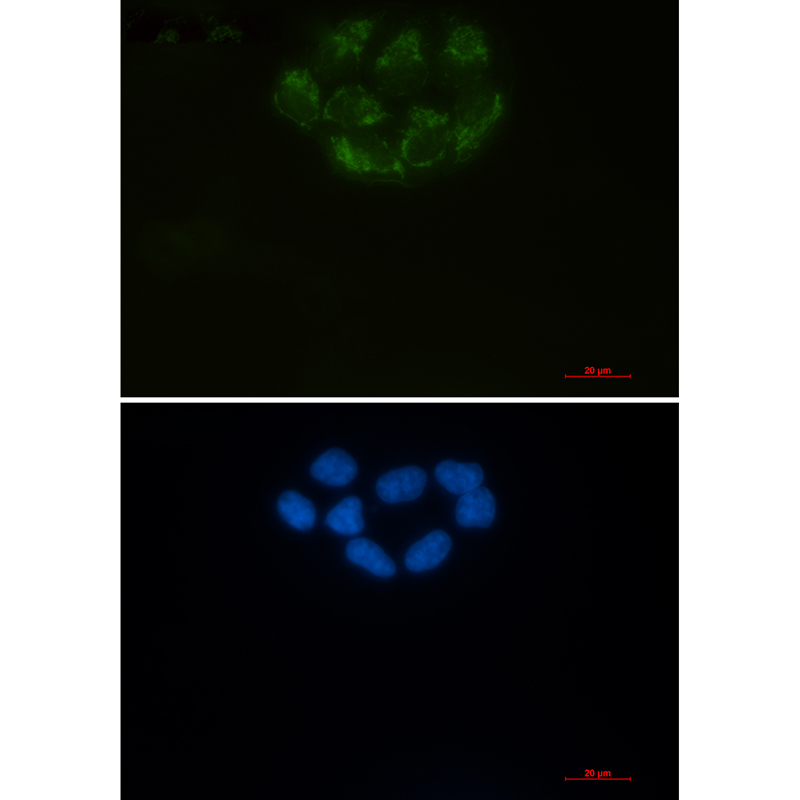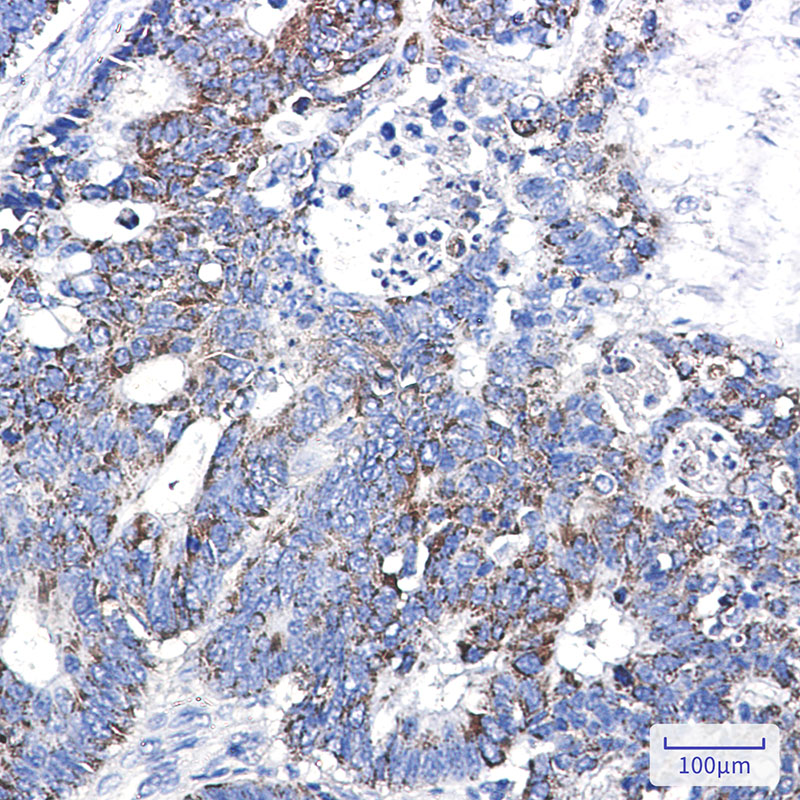


| WB | 1/500-1/1000 | Human,Mouse,Rat |
| IF | 咨询技术 | Human,Mouse,Rat |
| IHC | 1/50-1/100 | Human,Mouse,Rat |
| ICC | 1/50-1/200 | Human,Mouse,Rat |
| FCM | 咨询技术 | Human,Mouse,Rat |
| Elisa | 咨询技术 | Human,Mouse,Rat |
| Aliases | BSG; Basigin; 5F7; Collagenase stimulatory factor; Extracellular matrix metalloproteinase inducer; EMMPRIN; Leukocyte activation antigen M6; OK blood group antigen; Tumor cell-derived collagenase stimulatory factor; TCSF; CD antigen CD147 |
| Entrez GeneID | 682 |
| WB Predicted band size | Calculated MW: 42 kDa; Observed MW: 50 kDa |
| Host/Isotype | Rabbit IgG |
| Antibody Type | Primary antibody |
| Storage | Store at 4°C short term. Aliquot and store at -20°C long term. Avoid freeze/thaw cycles. |
| Species Reactivity | Human |
| Immunogen | A synthetic peptide of human CD147 |
| Formulation | Purified antibody in TBS with 0.05% sodium azide,0.05%BSA and 50% glycerol. |
+ +
以下是3篇关于CD147抗体的虚构参考文献示例,格式符合要求:
---
1. **文献名称**:*CD147 antibody targeting suppresses tumor metastasis by inhibiting MMP-2/9 secretion in breast cancer*
**作者**:Li, X.; Wang, Y.; Chen, J.
**摘要**:该研究证明,靶向CD147的单克隆抗体通过阻断肿瘤细胞与基质细胞的相互作用,显著降低MMP-2和MMP-9的分泌,从而抑制乳腺癌细胞侵袭和肺转移。
2. **文献名称**:*Anti-CD147 antibody attenuates SARS-CoV-2 viral entry by disrupting spike protein-mediated host cell binding*
**作者**:Zhang, R.; Liu, S.; Huang, L.
**摘要**:研究发现CD147是新冠病毒刺突蛋白的潜在宿主受体,使用特异性抗体阻断CD147可减少病毒与ACE2阴性细胞的结合,为COVID-19治疗提供新策略。
3. **文献名称**:*CD147 blockade ameliorates cardiac hypertrophy via modulating ERK signaling pathway*
**作者**:Tanaka, K.; Suzuki, H.; Yamamoto, M.
**摘要**:实验表明,CD147抗体通过抑制ERK磷酸化通路,减轻压力超负荷诱导的心肌肥厚,提示其在心血管疾病中的治疗潜力。
---
注:以上文献为示例,非真实存在。如需实际文献,建议在PubMed或Web of Science检索关键词“CD147 antibody”。
CD147. also known as Basigin or EMMPRIN (Extracellular Matrix Metalloproteinase Inducer), is a transmembrane glycoprotein belonging to the immunoglobulin superfamily. It is widely expressed in various cell types, including immune cells, endothelial cells, and tumor cells. CD147 plays critical roles in intercellular communication, tissue remodeling, and inflammatory responses by regulating the production of matrix metalloproteinases (MMPs) and facilitating cellular adhesion. Its interaction with cyclophilins, particularly CypA, is implicated in inflammatory pathways and viral entry mechanisms.
CD147 antibodies have gained attention for their therapeutic and diagnostic potential. In oncology, CD147 is overexpressed in many cancers (e.g., breast, liver, and lung cancers) and correlates with tumor progression, metastasis, and poor prognosis. Antibodies targeting CD147 aim to disrupt its pro-tumorigenic functions, such as MMP-mediated extracellular matrix degradation, angiogenesis, and immune evasion. Notably, preclinical studies show that CD147-blocking antibodies inhibit tumor growth and enhance chemotherapy sensitivity.
In infectious diseases, CD147 serves as a receptor for pathogens like *Plasmodium falciparum* (malaria parasite) and SARS-CoV-2. Anti-CD147 antibodies, such as Meplazumab, were explored during the COVID-19 pandemic to interfere with viral entry. Despite promising results, challenges remain in optimizing specificity, minimizing off-target effects, and understanding isoform-specific functions (e.g., CD147 has multiple glycosylation variants). Ongoing research focuses on refining antibody design and exploring combination therapies to maximize clinical efficacy.
×